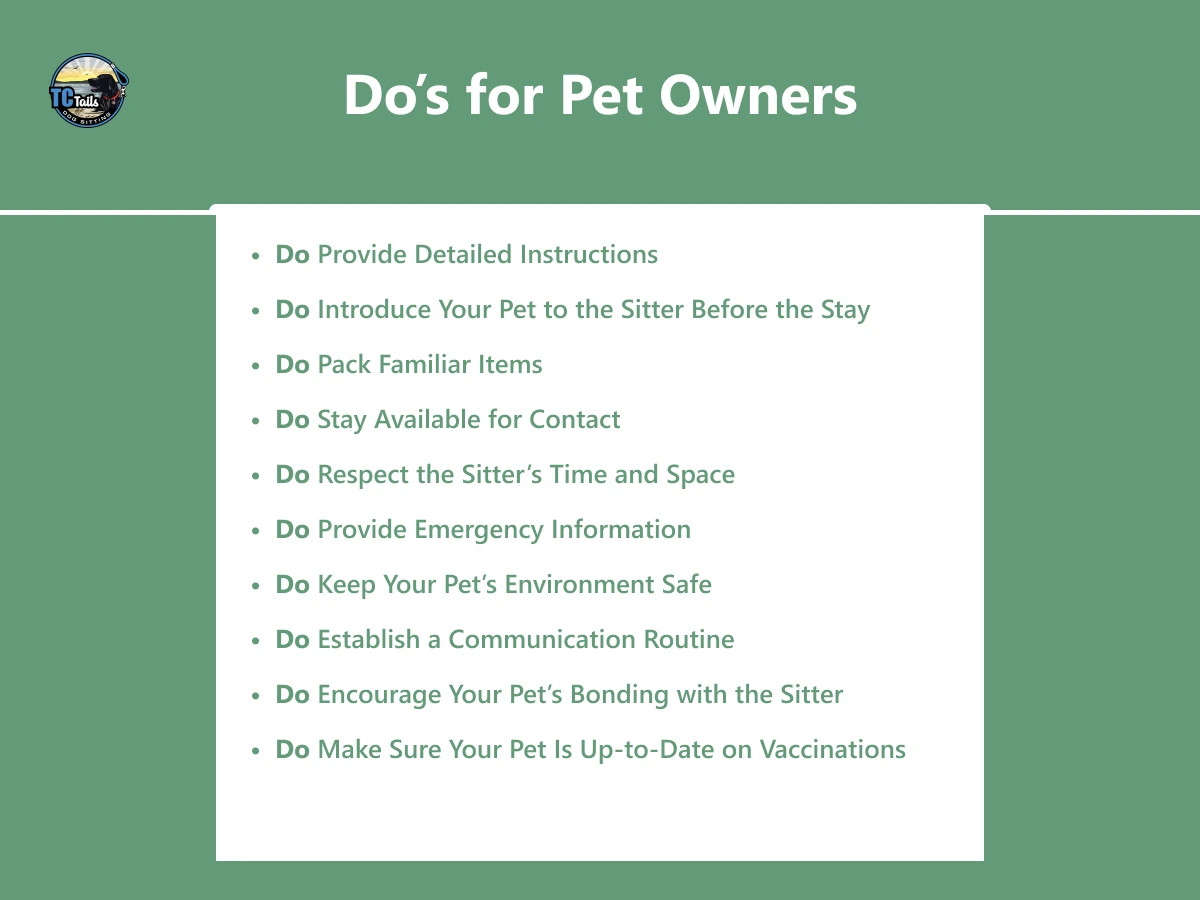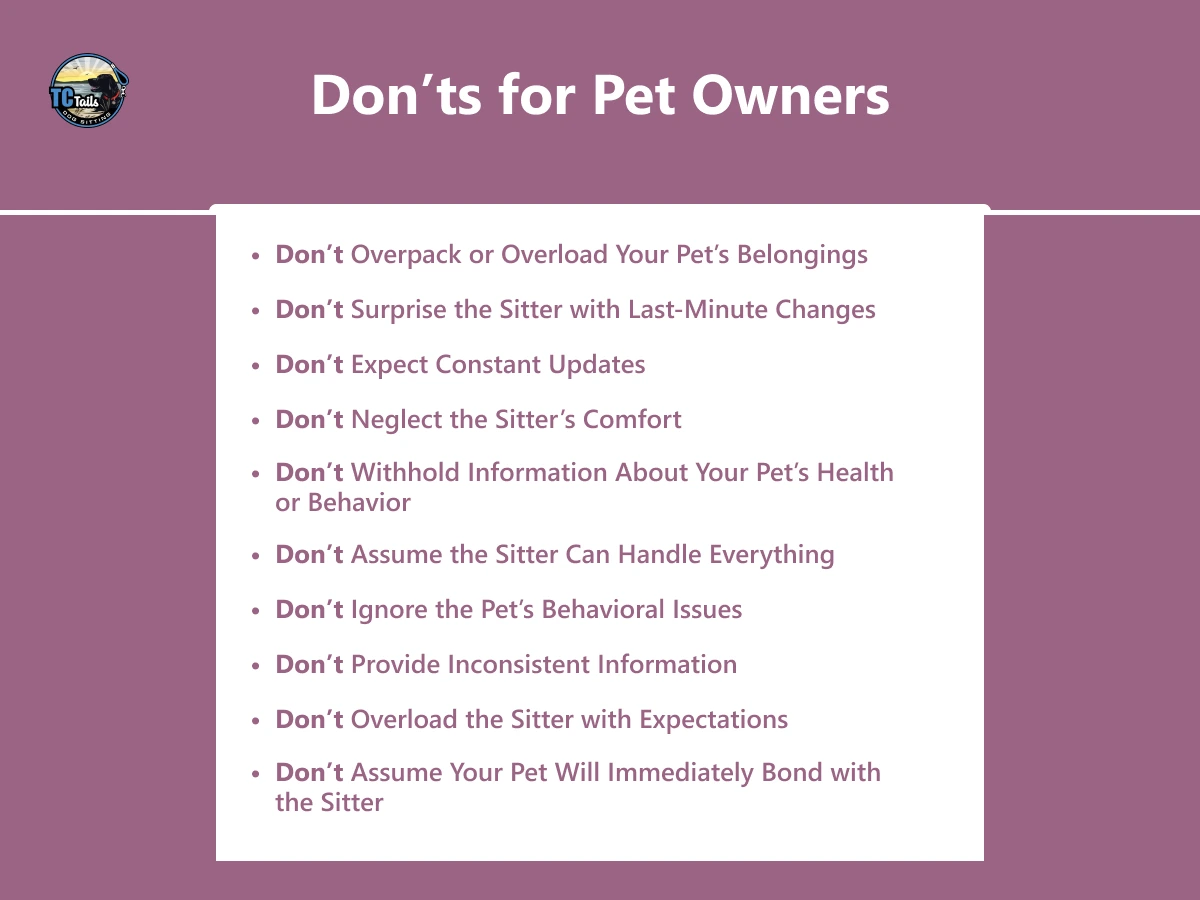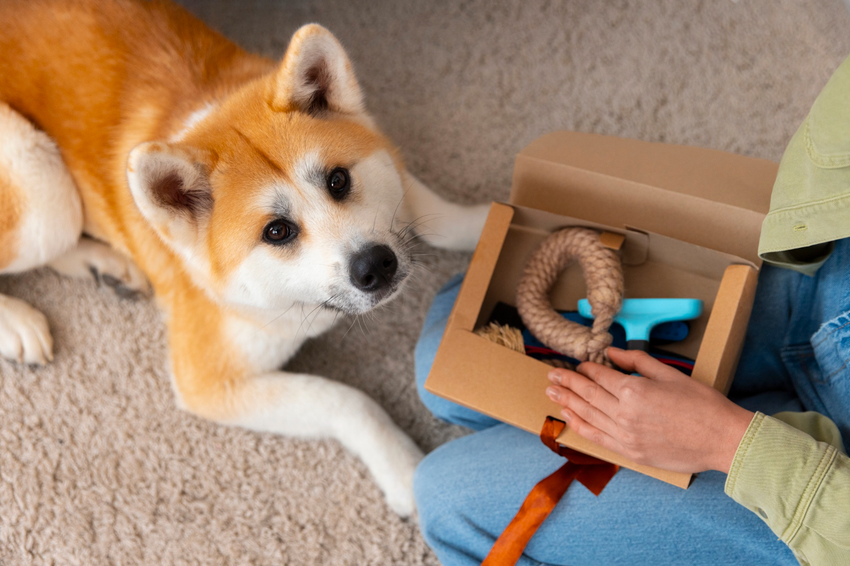When you choose an at home pet sitting service, it’s crucial to understand the etiquette that ensures a smooth experience for both you and your pet. Proper communication and preparation are key to ensuring your pet feels comfortable and well-cared-for in an unfamiliar environment.
Whether you’re seeking dog sitting Traverse City or pet boarding Traverse City, adhering to the right do’s and don’ts helps build a positive relationship with your sitter, keeping your pet happy and ensuring that the stay goes off without a hitch.
In this guide, we’ll cover the essential pet sitting etiquette that will help set both you and your pet up for success during their time away from home.
Read More About Essential Tips for a Successful Pet Sitting Experience
Do’s for Pet Owners When Choosing an In-Home Pet Sitting Service

Do Provide Detailed Instructions
Always provide comprehensive instructions about your pet’s routine, dietary preferences, medical needs, and any special care requirements. This will help the sitter provide personalized care for your pet. Be sure to specify things like feeding times, favorite playtime activities, or medication schedules.
Do Introduce Your Pet to the Sitter Before the Stay
Whenever possible, arrange a meet-and-greet before the pet sitting period begins. If you’re using a dog sitter Traverse City or another pet sitter Traverse City, this introduction allows your pet to familiarize themselves with the sitter’s scent and voice, easing the transition. The sitter can also learn your pet’s habits and preferences.
Do Pack Familiar Items
Sending your pet with familiar items such as their favorite toys, blanket, or a piece of your clothing will help them feel more comfortable during their stay. At home pet sitting services can be more successful when your pet has their own comforting items with them.
Read More About Checklist for Your Pet’s Boarding Stay
Do Stay Available for Contact
Ensure that your pet sitter has your contact information for emergencies and updates. Staying accessible can provide peace of mind, especially if your pet has special needs or if any unexpected issues arise during their stay.
Do Respect the Sitter’s Time and Space
Communicate any expectations clearly with the sitter before the stay. Make sure to discuss any extra responsibilities, such as administering medications or providing extra care, and respect the sitter’s time by keeping communication brief unless necessary. Remember that they are dedicated to providing care for your pet but may also have other responsibilities.
Do Provide Emergency Information
Be sure to provide the sitter with your veterinarian’s contact information, as well as any emergency medical needs your pet might have. This will help the sitter respond quickly in case of an emergency.
Do Keep Your Pet’s Environment Safe
Before leaving, ensure the sitter’s home or your own is safe for your pet. This includes checking for hazards such as open doors, dangerous items, or other pets that might not be compatible with yours. If your sitter will be coming to your home, make sure your pet is in a secure area to avoid any accidents.
Do Establish a Communication Routine
Set up a communication routine that works for both you and the sitter. For example, you could request a daily check-in through texts or videos to ensure your pet is doing well and to maintain peace of mind while you’re away.
Do Encourage Your Pet’s Bonding with the Sitter
Give your pet time to bond with the sitter by allowing them to spend quality time together. Whether it’s playing fetch or going on walks, engaging in activities together can help your pet feel more comfortable and secure.
Do Make Sure Your Pet Is Up-to-Date on Vaccinations
To keep both your pet and the sitter safe, make sure your pet’s vaccinations are current. Many pet sitting services will require proof of vaccination before accepting a booking, ensuring a healthy environment for everyone.
Trust TC Tails for your pet’s next stay! |
Don’ts for Pet Owners When Choosing an In-Home Pet Sitting Service

Don’t Overpack or Overload Your Pet’s Belongings
While it’s important to bring familiar items for your pet, avoid overpacking. A few of their favorite toys or a blanket should suffice. Overloading your sitter with excessive supplies can be overwhelming and unnecessary.
Don’t Surprise the Sitter with Last-Minute Changes
Avoid making last-minute changes to your pet’s care routine. Any alterations, such as a change in diet or schedule, should be communicated well in advance. Last-minute changes can disrupt the sitter’s preparation and potentially confuse your pet.
Don’t Expect Constant Updates
While it’s natural to want reassurance, don’t bombard the sitter with constant requests for updates. Sitters have a job to do, and excessive check-ins can interfere with their ability to focus on your pet. Agree on a schedule for updates before the stay starts—perhaps a few photos or videos every day.
Don’t Neglect the Sitter’s Comfort
If your pet is being taken into a sitter’s home, it’s crucial to respect their environment. Don’t assume your sitter can handle everything; for example, if your pet has a tendency to destroy furniture or be difficult with other animals, make sure this is communicated clearly to avoid creating a stressful environment for the sitter.
Read More About Signs Your Dog Needs a Pet Sitter Instead of Boarding
Don’t Withhold Information About Your Pet’s Health or Behavior
Be upfront with the sitter about any medical conditions, anxiety issues, or behavioral problems your pet might have. Withholding this information can lead to difficulties in handling your pet and may even put their well-being at risk. For example, if your dog has separation anxiety during thunderstorms, let your sitter know so they can be prepared.
Don’t Assume the Sitter Can Handle Everything
Avoid assuming that your sitter can manage all aspects of your pet’s care without any guidance. Be specific about their needs and preferences, such as their daily routine, exercise, and any special requirements.
Don’t Ignore the Pet’s Behavioral Issues
If your pet exhibits challenging behaviors, like aggression or excessive barking, don’t ignore these problems. It’s crucial to discuss these issues with the sitter beforehand, so they are prepared to manage them in a calm and safe manner.
Don’t Provide Inconsistent Information
Don’t give your sitter conflicting information about your pet. For example, if one family member mentions a different routine or preference than another, this can cause confusion and make it harder for the sitter to follow a consistent plan.
Don’t Overload the Sitter with Expectations
While it’s natural to want the best for your pet, avoid expecting the sitter to go beyond the agreed-upon responsibilities. For example, don’t expect them to train your dog or handle behavior problems unless it was discussed in advance.
Don’t Assume Your Pet Will Immediately Bond with the Sitter
Even with careful preparation, pets may need time to adjust to a new environment and a new person. Don’t be disappointed or frustrated if your pet doesn’t immediately bond with the sitter. Allow them to form a relationship at their own pace.
| Give your pet the best experience with TC Tails! Book their stay today for professional care and a welcoming environment they’ll love. |
Conclusion
Adhering to proper in-home pet sitting etiquette helps ensure that both you and your pet have a stress-free experience. By following the do’s and don’ts mentioned above, you are setting up both your pet and the sitter for success. Whether you are booking a dog boarding Traverse City service or seeking an at home pet sitting near me, the right communication and preparation are key.
If you’re looking for a trusted pet sitting Traverse City service, contact TC Tails today. Their professional pet sitters provide exceptional care and are ready to offer your pet a comfortable, home-away-from-home experience.
FAQs
What is the difference between at-home pet sitting and pet boarding services?
At-home pet sitting typically involves the sitter caring for your pet in their own home, whereas pet boarding services involve your pet staying at a facility that caters to pets.
How can I ensure my pet feels comfortable in a new environment?
Bring familiar items such as their favorite toys, blanket, and food, and ensure the sitter has clear instructions on your pet’s routine.
Can my pet sitter handle pets with special needs or medical conditions?
Yes, many dog sitters Traverse City and pet sitters Traverse City have experience with pets that require special care. Just make sure to communicate your pet’s needs before the stay.



